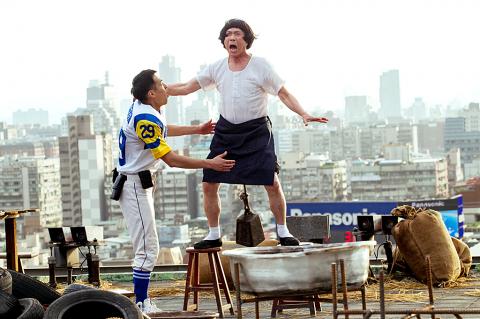The Lunar New Year is upon us and Taiwan’s film studios are releasing a few family-oriented comedies to draw in the holiday crowds. Foul-mouthed gagman Chu Ko Liang (豬哥亮) reprises his role of mob boss in David Loman 2, while television director Fung Kai’s (馮凱) second feature is the comedy-drama Rookie Chef (神廚).
‘ROOKIE CHEF’
From the makers of Din Tao: Leader of the Parade (陣頭, 2012), Rookie Chef examines fatherly love. At the center of the drama is widower Chih-ming (Wang Po-chieh, 王柏傑), a man who goes on the run with his young daughter Lele (Hsu Hsuan-le, 許萱樂) after losing a custody battle with his father-in-law (Chien Chang, 檢場).

Photos courtesy of Activator Marketing Company and Hualien Media International
A series of coincidences finds the father and daughter at the home of Chi Bao’s (Lorene Ren, 任容萱), where Chih-ming soon discovers the hidden recipes of a legendary chef — Chi Bao’s grandmother — that will form the menu of a restaurant that they plan to open.
At two hours, the movie could have benefited from better editing. Chih-ming’s past history as an irresponsible father and husband is only revealed halfway through the movie, too late to fully develop his character as a man willing to change for the sake of his daughter. By the time the protagonist rises to his challenge, we’ve already lost interest or become distracted by the film’s contrived coincidences and underdeveloped characters.
Shining through this visual mediocrity is the performance of acclaimed actress Lu Yi-ching (陸弈靜). Discovered by Tsai Ming-liang (蔡明亮), Lu is typically cast in serious roles. However, in Rookie Chef, she shows off her funny side, wonderfully fusing well-timed humor with a sense of maternal warmth.

Photos courtesy of Activator Marketing Company and Hualien Media International
‘DAVID LOMAN 2’
David Loman 2 (大尾鱸鰻2) reprises the same bawdy humor and sight gags that made its predecessor a Lunar New Year hit in 2013.
Now retired from the criminal underworld, Loman runs a bed and breakfast with his loud, boisterous family. The plot is built around various domestic situations — a relationship crisis between Loman’s daughter Jin (Amber Kuo, 郭采潔) and her partner Xiao Ho (Tony Yang, 楊祐寧), as well as unresolved issues between David’s wife (Miao Ke-Li, 苗可麗) and her younger sister Hottie (Joanne Lien, 連靜雯). Hong Kong’s big boss Brother Tien (Eric Tsang, 曾志偉) soon arrives to meddle in everyone’s affairs.
As the comedy formula requires, everybody gathers together at the end of the movie to celebrate a wedding. It is actually one of the movie’s better moments, attended by all manner of appealing lunacy and antic buffoonery.
David Loman 2 has a strong episodic feel, with some sections working better than others. However, the story suffers from incoherent sentiments to the point of being nonsensical.
Liang’s jokes rely on the vulgar and the lewd, though he has toned down considerably the profanity, possibly due to the criticism David Loman I received for having too much it.
In short, David Loman 2 fails to appeal because it simply repeats itself. It is probably not wise to make it a trilogy.

May 11 to May 18 The original Taichung Railway Station was long thought to have been completely razed. Opening on May 15, 1905, the one-story wooden structure soon outgrew its purpose and was replaced in 1917 by a grandiose, Western-style station. During construction on the third-generation station in 2017, workers discovered the service pit for the original station’s locomotive depot. A year later, a small wooden building on site was determined by historians to be the first stationmaster’s office, built around 1908. With these findings, the Taichung Railway Station Cultural Park now boasts that it has

Wooden houses wedged between concrete, crumbling brick facades with roofs gaping to the sky, and tiled art deco buildings down narrow alleyways: Taichung Central District’s (中區) aging architecture reveals both the allure and reality of the old downtown. From Indigenous settlement to capital under Qing Dynasty rule through to Japanese colonization, Taichung’s Central District holds a long and layered history. The bygone beauty of its streets once earned it the nickname “Little Kyoto.” Since the late eighties, however, the shifting of economic and government centers westward signaled a gradual decline in the area’s evolving fortunes. With the regeneration of the once

The latest Formosa poll released at the end of last month shows confidence in President William Lai (賴清德) plunged 8.1 percent, while satisfaction with the Lai administration fared worse with a drop of 8.5 percent. Those lacking confidence in Lai jumped by 6 percent and dissatisfaction in his administration spiked up 6.7 percent. Confidence in Lai is still strong at 48.6 percent, compared to 43 percent lacking confidence — but this is his worst result overall since he took office. For the first time, dissatisfaction with his administration surpassed satisfaction, 47.3 to 47.1 percent. Though statistically a tie, for most

In February of this year the Taipei Times reported on the visit of Lienchiang County Commissioner Wang Chung-ming (王忠銘) of the Chinese Nationalist Party (KMT) and a delegation to a lantern festival in Fuzhou’s Mawei District in Fujian Province. “Today, Mawei and Matsu jointly marked the lantern festival,” Wang was quoted as saying, adding that both sides “being of one people,” is a cause for joy. Wang was passing around a common claim of officials of the People’s Republic of China (PRC) and the PRC’s allies and supporters in Taiwan — KMT and the Taiwan People’s Party — and elsewhere: Taiwan and